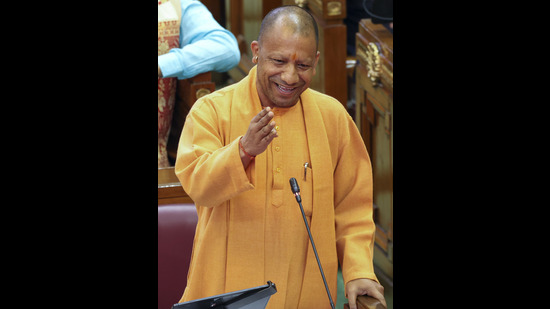Sanatan, Dalit, development: Yogi’s 3-card ploy in 2027 play
CM Yogi Adityanath emphasized Sanatan, Dalit welfare, and development in UP, claiming BJP will win 2027 elections and highlighting government achievements.
Chief minister Yogi Adityanath on Monday played the Sanatan, Dalit and development cards to take on the Opposition in the state assembly.

He was speaking on the motion of thanks to the governor’s address to a joint sitting of both Houses.
The BJP will again retain power in the 2027 assembly election as he termed the Opposition parties as anti- Sanatan, against the welfare of Dalits and the development of Uttar Pradesh.
“Out of the country’s population of 144 crore, 110 crore are the followers of Sanatan Dharma.The Mahakumbh is a globally unparalleled event. Millions of devotees belonging to various castes and classes have come together at the Prayagraj Mahakumbh to take a holy dip at the confluence of Ganga and the Yamuna,” he said.
The Pran Pratishtha (consecration) ceremony of Ram Lalla in Ayodhya the previous year and Mahakumbh in Prayagraj have captivated the followers of Sanatan Dharma, he said.
Hitting out at the Samajwadi Party, he said the then chief minister didn’t even take the time to oversee or review the Kumbh arrangements.
“A non-Sanatani was made in charge of event leading to chaos, corruption and pollution during the 2013 Kumbh. Due to pollution at Triveni Sangam, the Prime Minister of Mauritius refused to take a dip,” he said.
“This year, the Mahakumbh has seen participation from people across the country and the world. The President, Prime Minister, Vice President, the King of Bhutan and representatives from 74 countries have attended, making it a global event. People from North, South, East, and West have come together to celebrate this grand spiritual gathering for the first time,” he said.
Under the SP government, the contributions of Ambedkar, Kanshi Ram and other Dalit-backward leaders were neglected, he said. Drawing a contrast, he said under the BJP government, several initiatives were launched to honour the Dalit icons, including construction of Panch Teerthas and establishment of the Ambedkar International Center.
“The year 2024 marked the Amrit Mahotsav year of the Indian Constitution, the country is celebrating 75 years of implementation of Constitution. The government has launched several projects to highlight contribution of Ambedkar,” he said.
Projects have been also launched to highlight the contributions of Sant Ravidas, Sant Kabir, Maharshi Valmiki and Maharaja Suheldev, he said, adding the SP government had planned to demolish Dalit icons’ memorials.
Recalling the infamous guest house case of 1995 during the SP regime, he said despite the legal clean chit, the party’s past actions continued to haunt its leaders.
He highlighted the state government’s commitment to lifting the poor out of poverty within the next three years.
“Over the past eight years, 25 crore people in India and six crore in U.P. have been raised above the poverty line,” he said.
The BJP government organised Global Investors Summit contributing to the state’s economic growth, he said. The state had got investment proposals worth over ₹40 lakh crore, out of which ₹15 lakh crore has already materialised, creating employment opportunities for more than 60 lakh youths , he added.
In comparison to 2017, the per capita income has doubled to ₹93,514, the chief minister said, adding that the state government has launched network of expressways and highways across the state.
The state government has launched welfare schemes for marginalised communities, including Tharu, Kol, Chero, Saharia and Musahar communities residing in various parts of the state, he added.
The state government is also working for police modernisation and reforms, he said, adding that recruitment of 60,000 police constables is in progress and soon recruitment of 30,000 constables will start.
Along with cracking down on the criminals, the state government has checked the crime rate, he said.
He highlighted projects and schemes launched by the state government in the education, health, electricity, agriculture and industry sectors.






